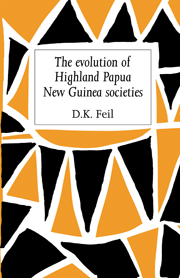Book contents
- Frontmatter
- Contents
- List of plates
- List of maps and tables
- Preface
- 1 Prologue: anthropology in the Papua New Guinea highlands
- 2 Papua New Guinea highlands prehistory: a social anthropologist's view
- 3 Configurations of intensity
- 4 Warfare
- 5 Leadership and politics
- 6 Social structure
- 7 Male–female relations
- 8 Ceremonial exchange
- 9 The legacy of the past
- Bibliography
- Index
5 - Leadership and politics
Published online by Cambridge University Press: 05 January 2012
- Frontmatter
- Contents
- List of plates
- List of maps and tables
- Preface
- 1 Prologue: anthropology in the Papua New Guinea highlands
- 2 Papua New Guinea highlands prehistory: a social anthropologist's view
- 3 Configurations of intensity
- 4 Warfare
- 5 Leadership and politics
- 6 Social structure
- 7 Male–female relations
- 8 Ceremonial exchange
- 9 The legacy of the past
- Bibliography
- Index
Summary
Not only Matoto, but Kavagl of Chimbu … seem to be men whose status is based in large part, if not centrally, upon audacity, a capacity for violence, or an awesome persona.
J. Watson (1971:264)The dynamics of divergent agricultural and subsistence histories in the eastern and western highlands provide the necessary foundation upon which to build a comparative analysis of the ethnographic present in the highlands of Papua New Guinea. In the previous chapter, a differing emphasis on, and intensity of, warfare, east to west, was related to the relative presence or absence of effective means and valued intergroup relations to control and subdue it. Few, if any, such mechanisms or important relations exist in the eastern highlands. Warfare, is thus fierce and endemic. Small, localised descent groups are tightly bounded and united, and extragroup contacts of any kind count for very little. Recent permanent settlement and a shallow agricultural past, linked to an inconsequential concern with pig production, are key variables in what ethnographers of the region have unanimously described as a high priority given to warfare and aggression in a context void of accepted and alternative methods of social control between groups. In the western highlands, by contrast, transactions and exchanges of pigs (and other valuables) based on an ancient commitment to their intensified production, this being reliant on a similarly ancient intensified agricultural regime, provided the means demanded by sedentary, populous and proximate groups for a measure of security and political stability.
- Type
- Chapter
- Information
- The Evolution of Highland Papua New Guinea Societies , pp. 90 - 122Publisher: Cambridge University PressPrint publication year: 1987



